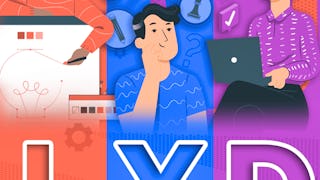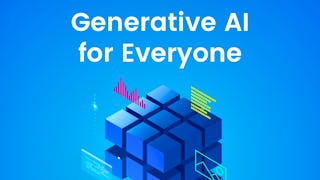Filter by
SubjectRequired
LanguageRequired
The language used throughout the course, in both instruction and assessments.
Learning ProductRequired
LevelRequired
DurationRequired
SkillsRequired
SubtitlesRequired
EducatorRequired
Explore the Inquiry Based Learning Course Catalog
 Status: NewStatus: Free Trial
Status: NewStatus: Free TrialVanderbilt University
Skills you'll gain: Prompt Engineering, ChatGPT, Productivity, Creative Problem-Solving, Generative AI, AI Personalization, Creative Thinking, Artificial Intelligence, Innovation, Brainstorming, Large Language Modeling, Game Design, Creativity, Education Software and Technology, Technical Communication, Ingenuity, Resourcefulness, Interactive Design, Problem Solving, Critical Thinking
 Status: Free Trial
Status: Free TrialUniversity of Michigan
Skills you'll gain: Multimedia, Learning Theory, Instructional Design, Web Content Accessibility Guidelines, Educational Materials, Learning Management Systems, Course Development, Design Thinking, Professional Development, Brainstorming, Education Software and Technology, Motivational Skills, Communication, Design, Student-Centred Learning, Creative Thinking, Diversity Equity and Inclusion Initiatives, User Centered Design, Technology Strategies, Quality Assurance

DeepLearning.AI
Skills you'll gain: Prompt Engineering, Generative AI, Large Language Modeling, OpenAI, ChatGPT, Artificial Intelligence, Artificial Intelligence and Machine Learning (AI/ML), Business Process Automation, Automation, Ethical Standards And Conduct, Cloud Applications

University of Illinois Urbana-Champaign
Skills you'll gain: Differentiated Instruction, Collaborative Software, Education Software and Technology, Pedagogy, Learning Management Systems, Digital Transformation, Emerging Technologies, Innovation, Multimedia, Digital Communications

École Polytechnique
Skills you'll gain: Language Competency, Oral Comprehension, Language Learning, Grammar, Intercultural Competence, Higher Education, Oral Expression, Culture, Vocabulary, Writing
 Status: Free Trial
Status: Free TrialSkills you'll gain: Exploratory Data Analysis, Feature Engineering, Data Cleansing, Data Access, Data Analysis, Statistical Inference, Statistical Hypothesis Testing, Data Quality, Data Science, Probability & Statistics, Jupyter, Machine Learning, Data Manipulation, Pandas (Python Package), Statistical Analysis, Data Transformation, Artificial Intelligence
 Status: Free Trial
Status: Free TrialDeepLearning.AI
Skills you'll gain: Tensorflow, Computer Vision, Image Analysis, Keras (Neural Network Library), Natural Language Processing, Time Series Analysis and Forecasting, Deep Learning, Artificial Neural Networks, Generative AI, Applied Machine Learning, Predictive Modeling, Artificial Intelligence and Machine Learning (AI/ML), Text Mining, Forecasting, Data Processing, Supervised Learning
 Status: Free Trial
Status: Free TrialMicrosoft
Skills you'll gain: Unsupervised Learning, Microsoft Azure, Applied Machine Learning, Regression Analysis, Predictive Modeling, Machine Learning Methods, Statistical Machine Learning, Machine Learning, Machine Learning Algorithms, Classification And Regression Tree (CART), Artificial Intelligence, Automation, Supervised Learning

Peking University
Skills you'll gain: Language Learning, Language Competency, Vocabulary, Oral Expression, Oral Comprehension
 Status: Free Trial
Status: Free TrialMacquarie University
Skills you'll gain: Microsoft Excel, Dashboard, Excel Formulas, Data Visualization, Spreadsheet Software, Excel Macros, Data Validation, Data Entry, Data Analysis Expressions (DAX), Data Cleansing, Data Modeling, Financial Forecasting, Predictive Modeling, Financial Modeling, Workflow Management, Finance, Business Intelligence Software, Consolidation, Data Integrity, Productivity Software

Yonsei University
Skills you'll gain: Language Competency, Grammar, Vocabulary, Literacy, Culture

Yale University
Skills you'll gain: Psychology, Mental and Behavioral Health Specialties, Child Development, Mental Health, Human Learning, Social Sciences, Behavioral Health, Neurology, Biology, Scientific Methods
Inquiry Based Learning learners also search
In summary, here are 10 of our most popular inquiry based learning courses
- Generative AI and ChatGPT for K-12 Educators: Vanderbilt University
- An Introduction to Learning Experience Design (LXD): University of Michigan
- Generative AI for Everyone: DeepLearning.AI
- e-Learning Ecologies: Innovative Approaches to Teaching and Learning for the Digital Age: University of Illinois Urbana-Champaign
- Étudier en France: French Intermediate course B1-B2: École Polytechnique
- Exploratory Data Analysis for Machine Learning: IBM
- DeepLearning.AI TensorFlow Developer: DeepLearning.AI
- Microsoft Azure Machine Learning: Microsoft
- Chinese for Beginners: Peking University
- Excel Skills for Business: Macquarie University










